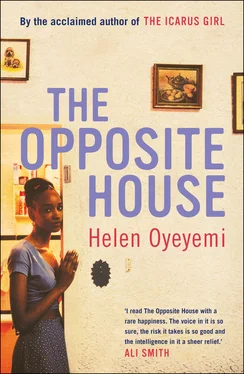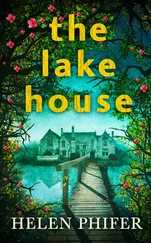Helen Oyeyemi - The Opposite House
Здесь есть возможность читать онлайн «Helen Oyeyemi - The Opposite House» весь текст электронной книги совершенно бесплатно (целиком полную версию без сокращений). В некоторых случаях можно слушать аудио, скачать через торрент в формате fb2 и присутствует краткое содержание. Год выпуска: 2008, Издательство: Bloomsbury UK, Жанр: Современная проза, на английском языке. Описание произведения, (предисловие) а так же отзывы посетителей доступны на портале библиотеки ЛибКат.
- Название:The Opposite House
- Автор:
- Издательство:Bloomsbury UK
- Жанр:
- Год:2008
- ISBN:нет данных
- Рейтинг книги:4 / 5. Голосов: 1
-
Избранное:Добавить в избранное
- Отзывы:
-
Ваша оценка:
- 80
- 1
- 2
- 3
- 4
- 5
The Opposite House: краткое содержание, описание и аннотация
Предлагаем к чтению аннотацию, описание, краткое содержание или предисловие (зависит от того, что написал сам автор книги «The Opposite House»). Если вы не нашли необходимую информацию о книге — напишите в комментариях, мы постараемся отыскать её.
The Opposite House — читать онлайн бесплатно полную книгу (весь текст) целиком
Ниже представлен текст книги, разбитый по страницам. Система сохранения места последней прочитанной страницы, позволяет с удобством читать онлайн бесплатно книгу «The Opposite House», без необходимости каждый раз заново искать на чём Вы остановились. Поставьте закладку, и сможете в любой момент перейти на страницу, на которой закончили чтение.
Интервал:
Закладка:
Through the park’s trees a race has begun, and I squint short-sightedly, trying to differentiate Tomás from the other two tall, short-haired black boys lashing the ground with trainer-clad feet. I spot him as I wend my way through the rows of low metal benches, stepping over seats. On the track, Tomás is second, arms pumping, neck muscles straining as he tries to get near the boy ahead of him. But the boy in front, his face laced on one side with a frothy comma of white paint, is leaping far, far ahead like a blank signal, so unreachable that only Tomás and he actually finish — near the finish line, the third boy curses, kicks off his shoes so that they fly wide, and jogs disconsolately off the track.
Two girls are sitting near me; their hair is in ponytails and they’re wearing the claret-coloured uniform of my old school. One is a West African girl, the other vaguely Jamaican-looking with that chill cast of the lips. They cheer and smile and wave their school scarves. They call out, ‘Tomás! Tomás!’ and I smile at them.
‘Do you know him?’ the shorter of the two calls to me. She’s the West African girl, pretty, snub-nosed and wide-eyed, and I hope that if she has a crush on Tomás he is paying her some kind of attention. I nod encouragingly at her, tell her he’s my brother and check the track, where Tomás and the white-faced boy are standing with their hands on their hips, puffing and stretching and listening to their PE teacher. Then the white-faced boy vaults over the barrier between the benches and the track and jogs toward us — he is Tomás, and I should wear my glasses more often. With the face paint, though, Tomás is different. The eye set in the white is cold and black and bright to excess, as if it contains him. He sits down between me and the girl, grins at the questions I’m wearing on my face, kisses my cheek. He licks his finger and draws it down his own cheek. Paint peels off like icing chipped with a knife. ‘It’s edible paint,’ he says. ‘Vanilla.’
‘And why is it on your face?’
He shrugs. The girl beside him wraps her scarf around his neck and unconvincingly garrottes him. He has taken to shaving a forward slash into his eyebrow, and I think I would like that in any male but my younger brother. Under his vest, the skin around his shoulder blade is swollen, with a shiny purplish tinge. I touch it; it’s still tender. Tomás pulls away and gets up to leave. Once we’re out of the girls’ sight he swerves and asks me what I’m doing here.
‘Chabella wants you —’
‘I know. I heard her fussing last night.’
‘She asked me to come and pick you up —’
‘Just in case I got lost on the way to your flat, isn’t it?’
‘Was that sarcasm?’
‘Nooooo,’ he says, pulling his rucksack straps tighter on his shoulders. His stance tells me nothing.
I follow behind him and ask, ‘Was that sarcasm?’
Nothing, so I say, ‘You were so fast today. I didn’t even know you could run that fast. What’s up, Speedy Gonzales?’
He doesn’t look round, but he takes a handkerchief from his pocket, wets it with his tongue and starts wiping off the face paint with even, practised dabs.
‘So, that short girl’s pretty,’ I try. ‘Is she your girlfriend?’
‘No, man!’
‘Ex-girlfriend?’
‘No, man!’
I see the problem. ‘Why don’t you just ask her out? I think she likes you.’
He doesn’t say anything until we get to the bus stop. He looks blankly at the bus timetable, then at me. ‘Do you think so?’
I try to keep a straight face. ‘Think what?’
He looks hopelessly circumspect. Girls are wearying him already.
‘That she, you know, likes me or whatever.’
‘Yes, man.’
On the top deck of the bus, he sits beside me and leans on me so that his elbow digs slightly into my side; he corners me with thermal weight.
‘What happened to your shoulder?’ I ask.
Tomás clears his throat, squeaks unintentionally, pulls a face because his voice is breaking and he can no longer trust it. I say again, ‘Your shoulder?’
‘There’s this boy in my class whose dad is Colombian or something. He’s such a dickhead. Truly. If you met him, you would straightaway think, “What a dickhead.” It’s something about the way he talks, the way he walks, his big walnut-shaped head —’
‘You hate him,’ I say. I am laughing.
‘No, he’s a good goalie. I just think he’s a dickhead. His name is Jorge Ruiz-Cole.’
‘Jorge Ruiz-Cole,’ I repeat, obediently. ‘What did Jorge Ruiz-Cole do?’
He replies on a long, low whistle, trying to strain his voice deep.
‘Well, he thinks he knows everything about Cubans, right, because his dad’s from Colombia or whatever, so he keeps asking me things, like about food and our family in Cuba and stuff like that, and I usually don’t answer him, so yesterday he asks me how come my surname doesn’t come in two parts, like why don’t I have two parts to my surname instead of just having my father’s surname. And I didn’t answer him. But he started pushing me and saying come on, come on, why are you so quiet, what, are you a bastard, is it your mother’s name? So I said, OK, it’s because we’re black Cubans, and it’s not the same as white Cubans you know, because at first in my mother’s family and my father’s family kids had the same surname because both their parents were slaves in the same household and had the same surname, their owners’ surname. You can’t have the children called Luis Fernandez-Fernandez or Luis Carrera-Carrera, so they had to work it out so that only the fathers’ surname got passed down, right? That’s what I told him. And when I said it, all the others started booing Jorge Ruiz-Cole and telling him to leave it and saying “Picking on a slave’s son! You knew that, you fat bastard!” Because this guy Jorge is actually quite fat.’
I put a finger over the hairless stroke in Tomás’s eyebrow, filling in his gap.
‘Then what happened?’
Tomás pinches me, not to hurt, just as a reflex to my touching him. ‘He got angry,’ he says, slowly. ‘Really angry. Because I think he was trying to make them laugh, but they were all on my side, because we’d watched Roots in History last week. So he was all pissed off, and he punched me in the face.’
‘Your face looks fine.’
‘I know. He’s shit at punching. So I punched him in the face, and then it was a fight.’ He sighed.
‘And?’
‘And then some of his friends came in.’
‘Came in where?’
‘Into the fight. It wasn’t personal, it was just, like, they were getting into the whole fighting thing.’
I stare at him. ‘And your friends?’
Tomás stretches, looks around me and out of the window.
‘Esos bastardos pequeños ! No one stuck up for you? Not one of them?’
‘It’s. . just school,’ he says.
‘It’s meant to be a Catholic school!’
We both think about that. We both dismiss it as a redundant factor.
He says, ‘Don’t tell Papi or Chabella.’
Tomás came home after his first day at secondary school and said he wasn’t going back. He said it standing up very straight by the kitchen table, as if he was making a formal report. Tomás was talking fact. Mami and Papi looked at each other; they had been prepared for the boy to say this.
(I had said the same kind of thing after my first day at secondary school: ‘Please don’t make me go any more, please, please, please or I promise you I will die of school! Morir ! And then you’ll see.’)
Papi went to a boys’ school too. He told Tomás to approach school using game theory; identify an aim (to survive) and two key strategies to minimise losses. He had to work out who were the strongest players and count himself as a weak player until he could make enough alliances to consider himself safe.
Читать дальшеИнтервал:
Закладка:
Похожие книги на «The Opposite House»
Представляем Вашему вниманию похожие книги на «The Opposite House» списком для выбора. Мы отобрали схожую по названию и смыслу литературу в надежде предоставить читателям больше вариантов отыскать новые, интересные, ещё непрочитанные произведения.
Обсуждение, отзывы о книге «The Opposite House» и просто собственные мнения читателей. Оставьте ваши комментарии, напишите, что Вы думаете о произведении, его смысле или главных героях. Укажите что конкретно понравилось, а что нет, и почему Вы так считаете.












